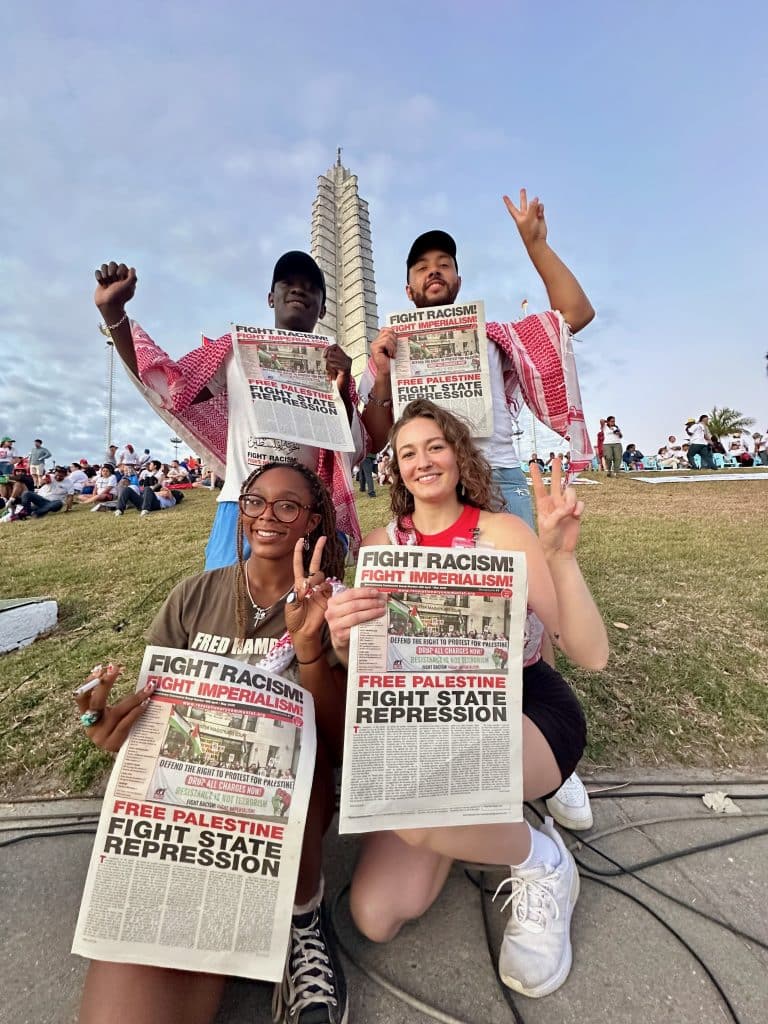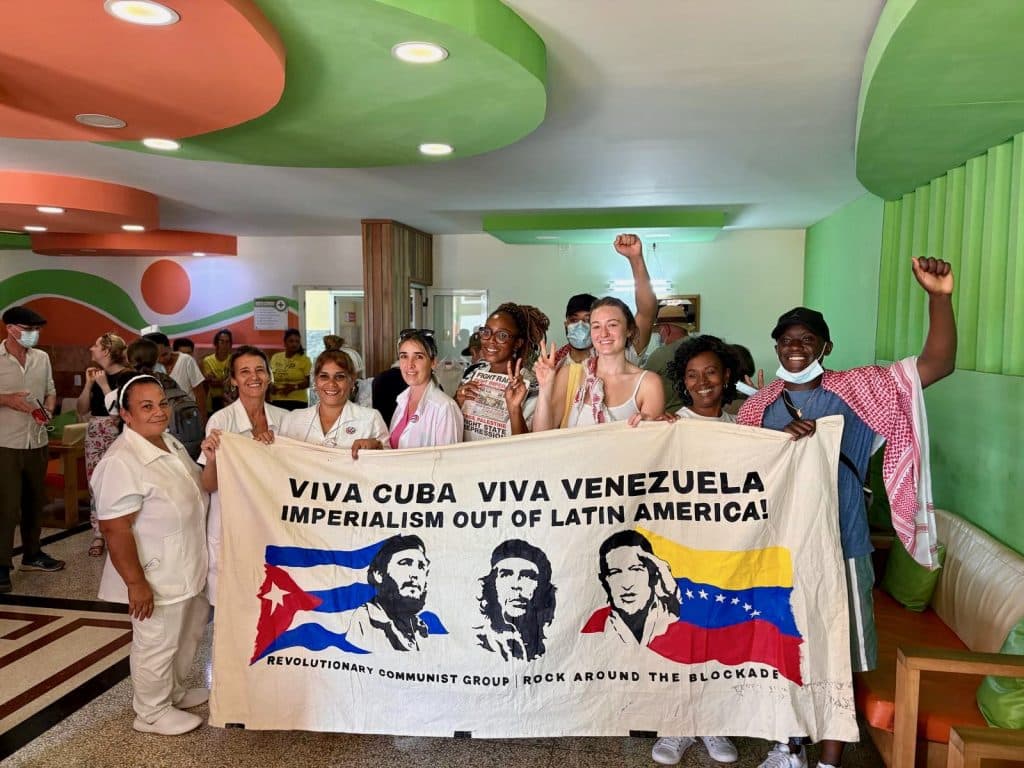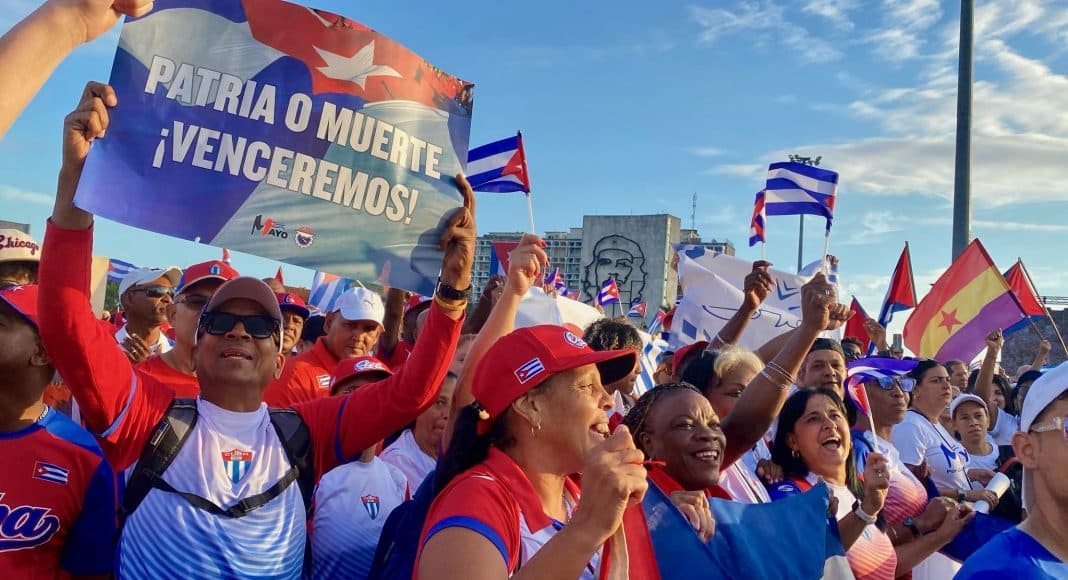This is an edited version of a speech delivered by Kotsai Sigauke, after his return from the 18th International May Day Brigade to Cuba organised by the Cuban Institute of Friendship with the Peoples, during our webinar ‘Stand with Cuba! End the blockade!’ on 18 May 2025.
Comrades from Rock around the Blockade (RATB), a campaign of the Revolutionary Communist Group (RCG) set up in solidarity with socialist Cuba, went to Cuba to participate in the International May Day Brigade. We joined over 300 people from 19 different countries on the brigade. We took material aid to the Cuban people and learned what it means to fight for socialism while under constant attack from US imperialism.

FRFI in Revolution Square, Havana
Witnessing socialism in practice
Our days were packed with sessions and we met with people from many sections of Cuban society; we saw first hand how Cuban people live and apply ‘creative resistance’ to survive and build socialism despite the blockade. To name just a few examples of our visits and sessions:
- discussions with students from the University of Artemisa who study agroecology and use their techniques to improve Cuban farming;
- visit to a school and a hospital to gain a concrete understanding of how the Cuban education and health system work;
- carried out voluntary labour on farms;
- a session with the trade union federation in Cuba;
- visit to the Che Guevara memorial in Santa Clara;
- visit to a scientific centre called Combiomed, a state enterprise that creates, produces and commercialises equipment related to cardiovascular medical treatment.
A particular highlight was an international conference on 2 May with delegations from around the world where Cuban President Miguel Diaz-Canel spoke about the importance of international solidarity.
Cuban internationalism
On the brigade we were able to witness the determination of the Cuban people to defend their national sovereignty. This was clearly illustrated on International Workers’ Day. Over 600,000 Cuban workers marched through the streets in Revolution Square in Havana alone. Similar events took place around the country, with an estimated five million Cubans out nationwide in loud and vibrant celebrations of the gains of their revolution. These were also marches in defence of Cuba’s socialist revolution, a show of defiance against US imperialism which is tightening its barbaric siege on the country by relentlessly introducing new punitive measures to suffocate Cuba. Despite their daily suffering, the Cuban people took to the streets to show that they will defend their revolution and their self-determination which they have made so many sacrifices for. It was really noticeable that young people were out in force, alongside older generations. They had drums and danced, or chanted with their flags and banners.
May Day also asserted the internationalism of the Cuban Revolution. There were many Palestine flags – demonstrating the Cuban people’s principled solidarity with Palestine and its struggle for national liberation. We saw flags from Venezuela, another country struggling for socialism and self-determination, and punished by US imperialism for its defiance. May Day rallies like this are unheard of in Britain – this year the May Day rally in London had only around 1,000 people. The Cuban people have May Day rallies like this because they are defending an active, living revolutionary process and they recognise that their struggle is an international one.
During the brigade we attended many other sessions that demonstrated the internationalism of Cuba. We visited the Latin American School of Medicine (ELAM), and we met medical students from all around the world who were given scholarships to study in Cuba for free. There were students from Africa, Palestine, the Caribbean and Latin America, regions that have been ravaged, underdeveloped and exploited by imperialism. Since its revolution, Cuba has had a firm commitment to fighting imperialism and underdevelopment around the world. That is why, despite the hardships caused by the blockade, they send doctors to some of the most oppressed countries in the world and train people from those countries in medicine so they can help their own people.
We watched a documentary by Belly of the Beast, a production company, called ‘From Gaza to Cuba’ that follows a Palestinian doctor from Gaza who studies at ELAM. The first chance he gets, he will be returning to Palestine to serve his community that is fighting Zionist occupation. The value of ELAM can’t be overstated. In a world where billions of people are denied access to healthcare, because imperialism puts profits over people, Cuba is the one country seriously fighting this with what little it has. It is not simply charity, it is internationalism in practice.
In Santa Clara, we met Cuban military veterans who had fought in Angola to defend the revolutionary government of the MPLA against apartheid South Africa and UNITA counter-revolutionaries in the 1970s, 1980s and 1990s. They were defending the Angolan Revolution from imperialism and their victory at Cuito Cuanavale in Angola contributed towards the collapse of the apartheid regime in South Africa and Namibia’s independence from racist South Africa’s occupation. One of the combatants went there to fight and stayed behind to teach in a village. These were very politically conscious veterans, who were keen to explain to us why they were in Angola and why they were proud of their internationalism. One of the veterans was asked why they wanted to go and fight in Angola and they replied ‘it was our debt to humanity’. That is the kind of consciousness the Cuban Revolution has created in its people. While imperialist states such as Britain and the US were economically, militarily and politically supporting white supremacy in southern Africa, Cubans were fighting and giving their lives to destroy it.
Cuba today remains on the frontline of the struggle against imperialism. It plays a central role in the anti-imperialist struggle alongside Venezuela, Palestine, and the Alliance of Sahel States. During celebrations marking the anniversary of the triumph of the Soviet Union against fascism in Russia, President Miguel Diaz-Canel stood alongside President Nicholas Maduro and President Ibrahim Traore of Burkina Faso. Like Cuba, these nations are under vicious attack because they have dared to stand up against imperialism and fight for their self-determination.

We must defend the Cuban Revolution
After US President Donald Trump’s inauguration, FRFI published an article titled ‘Trump 2025: a new era of US imperialism’; this ‘new era of US imperialism’ is being felt throughout the world. As US imperialism weakens, it becomes more reactionary and vicious as it desperately tries to maintain its hegemonic position and seek out new areas for profit-making and exploitation. The US provides arms and immunity to the Zionist state to continue its genocide in Gaza and ethnic cleansing in the West Bank and punitively tightens the siege of Cuba.
Cuba has been under this brutal blockade since 1960. The blockade is extraterritorial by its very nature – it is designed to stop all entities from dealing with Cuba whether they are US-based or not – so Cuba is isolated from world trade, cutting it off from critical necessities. Total damage to the Cuban economy is estimated to be $13m a day. Some estimates put the total economic damage to the Cuban economy to be trillions. Ships that dock in Cuba cannot dock in the US for six months; politically motivated US investors systematically buy up shares in companies that trade with Cuba so they fall under blockade regulations; and on 20 January Cuba was placed on the US State Sponsors of Terrorism (SSOT) list again making bank transactions with Cuba almost impossible. It is disgraceful that the US labels Cuba a ‘state sponsor of terrorism’, when the US establishment has sponsored terror attacks and outright invasions against Cuba and many other countries. A Cuban student asked the brigadistas at our camp to give one example of Cuban aggression against the US and no one could.
Trump’s new punitive measures include:
- financial sanctions on any entity that trades with Cuba (even the threat of multi-million dollar fines is enough to put most businesses, banks and other entities off interacting with Cuba);
- scaring off potential tourists to Cuba by threatening them with non-entry to the US;
- threatening third-party countries that accept Cuban doctors;
- penalties on anyone giving humanitarian assistance to Cuba;
- severe restrictions on family remittances from the US, further starving Cuba of hard currency.
The purpose of all this, in the words of Lester D Mallory, former US Secretary of State back in 1960 when the US was first devising its response to the Cuban Revolution, is to ‘weaken the economic life of Cuba… to bring about hunger, desperation and overthrow of government’. US imperialism cannot allow a successful example of socialism to exist on its doorstep, and it cannot allow a liberated nation that it cannot exploit to exist.
Now Cuba is in economic crisis and we saw the effects of this first hand:
- blackouts at least once a day;
- no running water at points throughout the day;
- buildings falling down due to lack of construction materials;
- Combiomed, the state run enterprise, forced to pay higher costs because it has to use intermediaries to make transactions due to US sanctions;
- the school we visited cannot supply textbooks for everyone so their students have to share;
- young people emigrating from the island due to lack of opportunities, exacerbating an already ageing population;
- Cuba cannot get the materials required to manufacture the medicines it needs;
- hospitals cannot get access to the newest equipment.
This blockade is a crime against humanity. It is also a testament to the Cuban people that they still continue to resist US imperialism despite being forced to live under these conditions. This is the reality of imperialism, a small island nation that wants nothing more than self-determination for itself and oppressed people around the world, is being punished with economic siege, military threats and state sponsored terrorism.
We need to continue to find creative ways to challenge the blockade from the grassroots. The 1Cent4Cuba campaign, a campaign to force banks outside the US to stop illegally blocking transactions to Cuba, is just one of those initiatives but there can be many more. RATB and RCG is organising a speaking tour to mark the 60th anniversary of the Tricontinental Conference next year. The Tricontinental Conference was a gathering of delegates from oppressed nations that were in the midst of national liberation struggles to discuss anti-imperialism and solidarity. At our speaking tour we will have speakers representing anti-imperialist and socialist struggles from around the world, including Cuba. We urge you all to get involved.
Moving forward, we need to have the image of this year’s May Day in our heads: whether organising in solidarity with Palestine, organising against state racism or organising in our workplaces – that image is the future we’re fighting for. Over 600,000 people celebrated and defended their revolution in Havana – despite the hardships, despite the privation imposed by US imperialism, despite the increasing attacks – the Cuban people continue to resist as they have done since the days of Spanish colonialism. The nation continues to be an inspiration to anti-imperialists around the world.
Down with the blockade!
Long live socialist Cuba!
Until victory, always!
FIGHT RACISM! FIGHT IMPERIALISM! 306 June/July 2025




